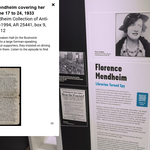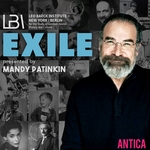Meine Liebe Käthe—A trove of century-old letters adds fuel to WWI debate



- Author
- David Brown
- Date
- Wed, Oct 28, 2015
When Günther Roth found himself sifting through the contents of a Baltimore attic in 2009, he did not expect to find key documents from one of the most disputed episodes in 20TH-century history. A more prosaic task had brought the now 84-year-old Emeritus Professor of Sociology at Columbia to the home of Christopher Jeffrey; the editors of Max Weber’s collected works had dispatched him to verify some vital details for the index of persons in Weber’s Gesamtausgabe. Jeffrey’s grandparents, Edgar Jaffé (1866 – 1921) and Else von Richthofen (1874 – 1973), both maintained close personal and professional ties with Max Weber, one of the founders of modern social science.
And yet, among the Jaffé-Richthofen family correspondence— more than a thousand of these letters are now in the LBI Archive—were intimate letters dashed off almost daily by a keen-eyed observer who describes in incisive detail how German statesmen and generals conducted the First World War.
In this case, they were also passionate love letters, from Kurt Riezler, a 32-year-old Bavarian Catholic diplomat (and distant relation of the Jaffé-Richthofen clan), to Käthe Liebermann, the daughter of the German-Jewish impressionist painter Max Liebermann. At 29, the beautiful daughter of one of the grandest of Grand Bourgeois Jewish families in Berlin had already turned down proposals from men of more illustrious pedigree, but Kurt Riezler was no ordinary suitor, and the impending war accelerated their courtship.
In the letters, it is clear that Riezler is infatuated with the raven-haired Jewish socialite he called his “schwarze Katze” (black cat), telling her how he longs to stroke her “black crown” with his “bear’s paw.” It was not just his way with words that won Käthe’s heart, however. Riezler’s gifted pen had also earned him a place in the corridors of power that surely set him apart from other eligible men as well.
Riezler had enjoyed a meteoric rise from Foreign Office press officer to become the closest confidant and advisor to Imperial Chancellor Theobald von Bethmann Hollweg. As the July Crisis unfolded after the assassination of Archduke Franz Ferdinand in Sarajevo on June 28, 1914, Riezler observed the impending catastrophe from the estate of the secluded Chancellor. But the one hundred letters to Käthe Liebermann begin only after he accompanied the Chancellor to military headquarters on August 17, 1914; they cover the crucial months through early 1915 and record his candid comments almost daily.
“What the letters show is the mood in the Großes Hauptquartier, the certainty of victory in the first month, followed by increasing doubts about the course of the war, and the eventual realization that war could be lost,” says Roth. Still in expectation of a quick victory, Riezler drafted on the Chancellor’s behalf the first plans for the German domination of the European continent, the so-called “September Program.”
Contested Archival Legacy
Riezler and his archival estate were already at the center of one of the longest and most acrimonious historical debates of the 20TH century, says historian John Röhl, an Emeritus Professor of History at the University of Sussex who is working with Roth to publish a “diplomatic edition” of the letters, that is, an accurate transcription with an extensive commentary. Röhl believes the letters support the position of scholars like him who argue that Germany bears the greatest responsibility for unleashing war in 1914.
The question of war guilt had been the subject of vehement debate since the first shots were fired, and the thesis of German guilt was at the root of the punitive Treaty of Versailles in 1919. Germany’s responsibility for the war, however, “was called into question by a tremendous effort on the part of conservative German historians and the German state in the interwar period,” says Röhl. “After the Treaty of Versailles and an initial flood of damning revelations, the German response was to deny responsibility while destroying and suppressing evidence that would undermine their claim that the war had been defensive.” Eventually, something resembling a consensus emerged that the nations of Europe had “slithered over the brink into the boiling cauldron of war,” in the words of Britain’s wartime prime minister, David Lloyd George. In that view, the war had been a terrible accident.
The German historian Fritz Fischer challenged this notion in 1961 with the publication of Griff nach der Weltmacht (published in English as Germany’s Aims in the First World War although the more provocative original title literally means “Grab for World Power”). The war had not simply descended on Europe like an unusually destructive weather-system, argued Fischer. Instead, Germany had deliberately provoked a war in order to support an annexationist foreign policy that was virtually identical to that pursued by Hitler just two decades later.
Fischer marshaled mountains of documentary evidence in support of his thesis, but key documents were still missing as a result of selective censorship by the Foreign Office of Weimar Germany, destruction of archives during WWII, and the division of Germany during the Cold War. Bethmann Hollweg’s personal papers were among the missing documents that might have delivered conclusive evidence but were irretrievably lost.
As the debate between Fischer’s followers and his conservative opponents led by Gerhard Ritter spilled over onto the Feuilletons of German papers, Kurt Riezler’s diaries were discovered in the possession of his brother Walter in Germany. Both sides hoped that the observations of the Chancellor’s closest aid would supply new ammunition for their own arguments, but instead a new debate erupted about the authenticity of the diaries. Fischer charged that the editor of the diaries, Karl Dietrich Erdmann, had selectively edited them to show Germany in a positive light. When the war-time diaries became public, it emerged that the pre-war volumes had been destroyed by Walter after Kurt’s death in the 1950s, and key entries for the July Crisis had likely been rewritten by Riezler himself after the fact.
Centennial Revisions
Nevertheless, says Röhl, Fischer’s core thesis that Germany had incited war in pursuit of an expansionist foreign policy became the basis of a new consensus after about 1965.
“Then suddenly, in 2014, we got a whole slew of books that seemed to return to the argument that the war had been some kind of accident,” says Röhl, whose three-volume biography of Kaiser Wilhelm II established him as an expert on the Wilhelmine period and the run-up to war.
The first and most influential of the centennial challenges to the Fischer thesis was the Cambridge historian Christopher Clark’s book on the origins of the First World War, The Sleepwalkers (2012). Clark eschews the “blame game,” and in his telling, the statesmen of Europe may lumber rather than slither but remain, though far from blameless, at least jointly culpable for the catastrophe.
Röhl remains firmly in the Fischer camp and points out that that the scales in this century old debate have always been tipped by the weight of contemporary political realities. “My good friend Christopher Clark felt he was on to a very good thing by challenging the accepted view, but his book also came at a time when the world was ready for a revision,” Röhl says.“Germany had been a peaceful democracy for decades, and it was no longer fashionable to believe that Germany bore responsibility for the war.”
“The Sleepwalkers was a huge success, especially in Germany,” Roth points out. “Now the Germans think they can relax since they are no longer mainly responsible for the First World War—that’s what really gets John’s hackles up.”
Historian John Röhl has written, “In terms of scholarship I find the new revisionism dismaying, as it involves the sidelining or suppression of so much of the knowledge we have gained through painstaking research over the past 50 years.”
Evidence is Still Evidence
“Evidence is still evidence,” insists Röhl, a statement that echoes Fritz Fischer’s extremely methodical document-based approach.
In his view, the evidence that Germany’s military and political leadership planned the war to achieve dominion over the continent is so overwhelming that the recent attempts to broaden the view to include the impact of smaller actors like Serbia or to relativize Germany’s war aims by comparing them to those of Britain or Russia amount to a willful neglect of the long-established record.
A century after the war began, however, the argument over the scope and authenticity of the sources was mostly settled.
“We had been operating on the basis nothing new would be found,” says Röhl, “which is why the discovery of the Riezler letters is so wonderful.” Röhl thinks that the letters fill some of the gaps left by the missing diaries. Although the first letters were written after the war had begun, Riezler does refer to Bethmann Hollweg’s thinking during the July Crisis on several occasions. “The Chancellor has a very good mind,” Riezler wrote Käthe in late August or early September 1914. “At least people must concede that he ‘staged’ it [the war] very well. Besides, the war, though not actually willed, was precisely calculated and broke out at the most favorable moment.” As early as October 27, 1914, Riezler abandoned hope of a swift and decisive victory. “The dream of winning on all three sides is over; the effort to make Germany Number One has also failed,” he confessed to Käthe. “Don’t be sad, the good German people must have amor fati; it does not have to perish if it does not receive the Greeks’ gift of world dominion.” In fact, it sometimes seems that the only thing Riezler fears more than German defeat is German victory. “After this war, we will have a reputation as the worst barbarians, and we won’t be able to show our faces anywhere abroad,” he tells Käthe in a letter on August 29, 1914 that refers to the complete destruction of the famous library in Leuven, Belgium at the hands of German soldiers.
A Remarkable Union
Despite his unique position as the Chancellor’s right hand, Riezler was an outsider among the Prussian aristocracy that led the military and diplomatic apparatus. Bavarian, Catholic, highly educated, and engaged to a wealthy Jewess, he was a cultural foil for the Prussian Junkers. He depicts a military leadership class bubbling over with antisemitic bile and arguing for even more brutal subjugation of Germany’s neighbors than Bethmann Hollweg would consider.
Riezler’s cultural affinities were closer to the wealthy Jewish milieu of Käthe Liebermann, and Roth, as a sociologist, says he values the letters for the depiction of this lost world. His interest is in the elite Jewish families that the Liebermanns associated with—the Reichenheims, Oppenheimers, Rathenaus, Mendelssohns, Cassirers—who largely defined commercial and cultural life in the German capital. “They were the ones, for instance, who bought modern art, not the Prussian establishment,” says Roth, noting that Kurt and Käthe extensively discussed the wartime experiences of collectors like Paul von Mendelssohn-Bartholdy and Paul Cassirer.
In his commentaries that will accompany the published letters, Roth discusses the fates of these families during World War I and under the Nazi regime as well. In 1938 Riezler emigrated to New York to save his wife, who remained Jewish under Nazi definitions, and their daughter Maria, a “half-Jew.” Max Liebermann’s widow stayed behind only to take her own life in 1943 before her imminent deportation.
“It’s not just about the question of who was responsible for the First World War,” says Roth. “Of course the Germans were responsible. I’ve never doubted that. But the letters also bespeak a remarkable union of these two people from different worlds, Kurt and Käthe.”
ONLINE
The Kurt Riezler Collection in DigiBaeck
From the Pen of Kurt Riezler
On intermarriage and conversion
DECEMBER 24, 1914
The others have just left for the Imperial church service, I as a heretic [Catholic] can stay behind. As regards the interesting question of baptism, we should stick to our understanding, church wedding unnecessary, baptism much to be preferred.
[…] Not to be baptized would be a demonstration that would not be understood and give the evil-minded people an opportunity.” […] “I am glad that on the religious matter your father follows the ostrich policy which is easy and advantageous for all sides concerned.
On the specter of German victory
OCTOBER 10, 1914
I really believe that if we win the war it will be the beginning of the end of Germany. Germany’s best quality is quite non-political—it’s incompatible with world domination. As Nietzsche said, the founding of the Empire was already a decline. On that score I am quite old-fashioned.
On antisemitism among the leadership
LATE SEPTEMBER, 1914
Now there is great jubilation over a newspaper report that in Tapiau [German impressionist Lovis Corinth’s hometown in East Prussia] a large Lovis Corinth was burned. The State Secretary (Foreign Secretary Gottlieb von Jagow) is reading it aloud. He probably doesn’t know a single painting by Lovis Corinth. Rather he suspects in “Lovis” a “Levi.” It is terribly funny.
Latest News





